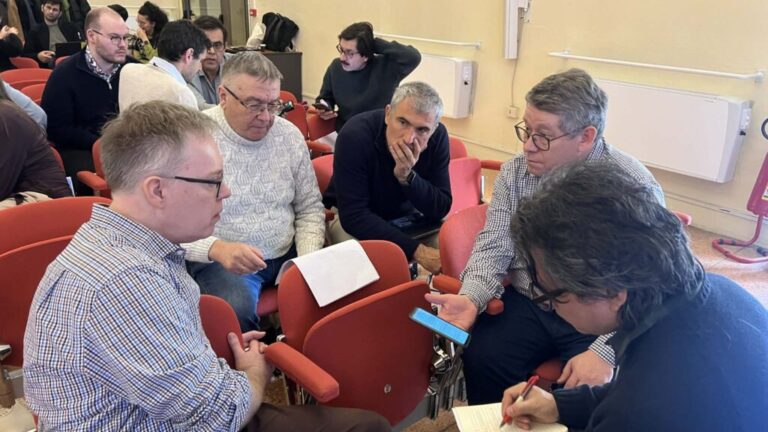
On 28 October, FARMWISE partners hosted a focused online workshop titled “Toekomstscenario’s voor waterbeheer in de landbouw” or “Future scenarios for water management in agriculture” to explore how climate change, irrigation strategies, and emerging technologies will shape the future of water management in Dutch agriculture.
Facilitated by Wageningen University, the session brought together 12 participants, including researchers, policymakers, provincial authorities, water boards, consultants, and representatives from regional media.
This workshop is part of FARMWISE’s ongoing effort to engage regional actors in co-developing practical, climate-resilient water solutions, grounded in real farm and watershed conditions.
 Context & Objective
Context & Objective
The Netherlands faces increasing challenges from shifting rainfall patterns, more frequent droughts, and growing pressure on water availability for agriculture. The workshop aimed to:
- Present updates on three key FARMWISE innovations tested in the Netherlands
➤ Agrodit
➤ Low-cost soil moisture sensors
➤ Subsurface irrigation systems (incl. controlled drainage via subirrigation – innovation 9) - Explore short- and long-term future scenarios for water availability
- Gather regional insights on the suitability of new technologies
- Discuss opportunities and challenges in expanding stakeholder involvement
This discussion is especially important in the Dutch context, where water boards and provinces play a central role in managing both water quantity and water quality.
 Discussion Highlights
Discussion Highlights
1⃣ Impact of rainfall variability on irrigation timing
Participants noted that rapidly changing rainfall patterns complicate decisions around when and how long irrigation is needed. This affects not only crop performance but also regional water storage strategies.
2⃣ Effects of subirrigation on water balance
Stakeholders explored how controlled drainage and subirrigation influence the distribution of water in the soil profile, evapotranspiration rates, and the long-term stability of groundwater levels.
Regional authorities, particularly from the Limburg region, contributed perspectives on how these systems perform under their local conditions.
3⃣ Suitability of innovation 9 under climate stress
A key question raised concerned how innovation 9 (controlled drainage with subirrigation) behaves during prolonged drought periods. Participants considered:
- whether its benefits are region-specific,
- its compatibility with climate projections,
- and how water boards can support adoption at scale.
The conversation expanded from regional experiences to national-level contrasts, highlighting the diversity of soil types, hydrological systems, and governance structures across the Netherlands.
4⃣ Stakeholder engagement challenges
Another topic was the practicality of expanding the stakeholder network via surveys. Several participants indicated that broader engagement may not be feasible without providing more context, guidance, and clarity on how the insights will be used.
 Key Insights & Emerging Conclusions
Key Insights & Emerging Conclusions
 Regional differences matter.
Regional differences matter.
The suitability of innovations such as controlled drainage or subsurface irrigation depends strongly on local soil types, groundwater levels, and climatic stresses.
 Short-term thinking remains dominant.
Short-term thinking remains dominant.
Stakeholders felt more confident evaluating scenarios within the next 10–20 years, compared to longer-term planning horizons.
 Long-term adoption requires investment.
Long-term adoption requires investment.
Several participants emphasised that making innovations future-proof will require substantial, forward-looking investment, particularly for infrastructure-heavy systems like controlled drainage.
 Expansion of stakeholder engagement is limited.
Expansion of stakeholder engagement is limited.
Due to time constraints and competing priorities, participants noted that significantly expanding the network via surveys may not be realistic in the Dutch context.
 Why This Matters for FARMWISE
Why This Matters for FARMWISE
This workshop strengthens FARMWISE’s ambition to:
- Co-create practical, region-sensitive water solutions
- Bridge local knowledge with digital and scientific tools
- Support water boards, provinces, and farmers in adapting to a changing climate
- Ensure innovations are tested, evaluated, and contextualised within real-world governance and environmental conditions
These insights feed directly into FARMWISE’s modelling work, scenario development, and the refinement of digital tools for sustainable water use.
 How Stakeholders Can Get Involved
How Stakeholders Can Get Involved
FARMWISE continues to welcome participation from:
- Farmers and grower associations
- Water boards and provinces
- Regional authorities and municipalities
- Irrigation specialists and environmental consultancies
- Researchers and innovation practitioners
Ways to participate include:
 Joining upcoming webinars and workshops
Joining upcoming webinars and workshops Collaborating on scenario-building activities
Collaborating on scenario-building activities Providing feedback on decision-support tools
Providing feedback on decision-support tools Sharing regional case studies and challenges
Sharing regional case studies and challenges Helping validate innovations under real farm conditions
Helping validate innovations under real farm conditions
To express interest or stay informed, please visit our Contact page.


